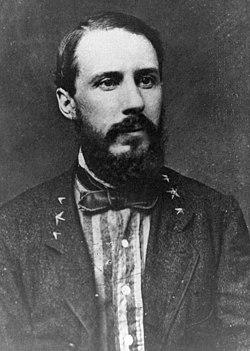
Back إدوارد بورتر الكسندر Arabic ادوارد بورتر الكسندر ARZ Edward Porter Alexander German Edward Porter Alexander Spanish Edward Porter Alexander Finnish Edward Porter Alexander French Edward Porter Alexander Italian エドワード・ポーター・アレクサンダー Japanese Edward Alexander Polish Александер, Эдвард Портер Russian
Edward Porter Alexander | |
|---|---|
 Photo taken in 1866 | |
| Born | May 26, 1835 Washington, Georgia |
| Died | April 28, 1910 (aged 74) Savannah, Georgia |
| Place of burial | Magnolia Cemetery, Augusta, Georgia |
| Allegiance | |
| Service | |
| Years of service | 1857–61 (USA) 1861–65 (CSA) |
| Rank | |
| Commands | Artillery |
| Battles / wars | |
| Alma mater | United States Military Academy |
| Other work | Railroad executive, planter, and author |
| Signature | |
Edward Porter Alexander (May 26, 1835 – April 28, 1910) was an American military engineer, railroad executive, planter, and author. He served first as an officer in the United States Army and later, during the American Civil War (1861–1865), in the Confederate Army, rising to the rank of brigadier general.
Alexander was the officer in charge of the massive artillery bombardment preceding Pickett's Charge, on the third day of the Battle of Gettysburg, and is also noted for his early use of signals and observation balloons during combat. After the Civil War, he taught mathematics at the University of South Carolina in Columbia, spent time in Nicaragua, and wrote extensive memoirs and analyses of the war, which have received much praise for their insight and objectivity. His Military Memoirs of a Confederate were published in 1907. An extensive personal account of his military training and his participation in the Civil War was rediscovered long after his death and published in 1989 as Fighting for the Confederacy.